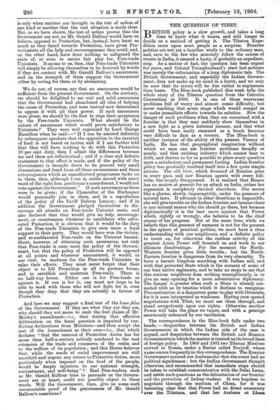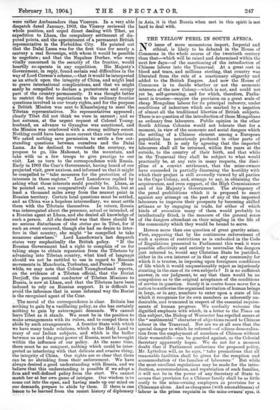THE QUESTION OF TIBET. B RITISH policy is a slow growth,
and takes a long time to know what it wants, and. still longer to decide on a method. of getting it. The Tibetan Expe- dition came upon most people as a surprise. Frontier politics are not yet a familiar study to the ordinary man, and, save to the few who minutely follow the course of events in India, it seemed a hasty, if probably an expedient, step. As a matter of fact, the question has been urgent for years, and. Colonel Younghusband's start last autumn was merely the culmination of a long diplomatic tale. The British Government, and especially the Indian Govern- ment, does not make up its mind in a hurry, and we may be sure that its errors will be due rather to supineness than haste. The Blue-book published this week tells the whole story of the Tibetan question from the Calcutta Convention in 1890. It is one of those wearisome problems full of worry and almost comic difficulty, but never reaching that acute stage which would compel us to make immediate efforts towards its solution. Now the danger of such problems when they are concerned with a frontier is that they may suddenly show themselves in a new light as a grave national menace, and that what could have been easily stemmed as a brook becomes very difficult to dam as a torrent. The Blue-book is another instance of the ability of the present Viceroy of India. He has that geographical imagination without which no man can see frontier problems broadly or sanely, and that untiring industry which cannot bear to drift, and desires so far as possible to place every question upon a satisfactory and permanent footing. Indian frontier policy has gradually resolved itself into a few quite simple axioms. The old view, which dreamed of Russian guns in every pass, and. saw Russian agents with every hill- tribe, has largely disappeared. It is realised that Russia has no motive at present for an attack on India, unless her expansion is completely checked elsewhere. She moves like a glacier, slowly, imperceptibly, under the pressure of natural laws. If advance in other directions is impossible, she will give trouble on the Indian frontier, not because there is any natural reason why she should go there, but because diplomatically it is the best move against that Power which, rightly or wrongly, she believes to be the chief enemy of her progress. But at the same time, while we believe that this greatest of menaces is not for the present in the sphere of practical politics, we must have a clear understanding with our neighbours, and a definite policy to insist on, for otherwise the restless activity of the greatest Asian Power will forestall us and work to our ultimate disadvantage. For the moment the North- Western frontier gives little .trouble ; but the North- Eastern frontier is dangerous from its very obscurity. To have a hermit kingdom marching with Indian soil, and with that protected State which is the nursery of some of our best native regiments, and to take no steps to see that this curious neighbour does nothing unneighbourly, is to give an easy opening for a more adventurous diplomacy. The danger is greater when such a State is already con- nected with us by treaties which it declines to recognise. Procrastination is a dangerous game to play with Orientals, for it is soon interpreted as weakness. Having once opened negotiations with Tibet, we must see them through, and stand scrupulously upon our rights. Otherwise another Power will take the place we vacate, and with a prestige enormously enhanced by our vacillation.
The correspondence in the Blue-book falls under two heads, — despatches between the British and Indian Governments in which the Indian side of the case is argued, and despatches between the British and Russian Governments in which the matter is treated on the broad lines of foreign policy. In 1900 and 1901 two Tibetan Missions arrived in Russia, under a Buriat called Dorjieff, whose name occurs frequently in this correspondence. The Russian. Government assured our Ambassador that the event had no political significance ; but the Indian Government thought otherwise, and recommended that immediate steps should be taken to establish communication with the Dalai Lama, and settle such questions as the delimitation of our frontier and the protection of Indian traders. It was hopeless to negotiate through the medium of China, for it was becoming clear that that Power had no direct suzerainty over the Tibetans, and that her Ambans at Lhasa were rather Ambassadors than Viceroys. In a very able despatch dated January, 1903, the Viceroy reviewed the whole position, and urged direct dealing with Tibet, an expedition to Lhasa, the compulsory settlement of dis- puted points, and the appointment of a permanent British representative in the Forbidden City. He pointed out that the Dalai Lama was for the first time for nearly a century a real Sovereign, with whom it would be possible to negotiate ; and that the Nepalese Durbar, who were vitally concerned in the security of the frontier, would heartily co-operate in any expedition. His Majesty's Government, in reply, found certain real difficulties in the way of Lord Curzon's scheme,—that it would be interpreted as an attack upon the integrity of China, and might lead to grave international complications, and that we might easily be compelled to declare a protectorate and occupy part of the country permanently. It was thought better to restrict the first negotiations to the ordinary frontier questions involved in our treaty rights, and for the purpose a British Mission was sent to Khambajong to meet the Tibetan representatives. No representatives appeared ; clearly Tibet did not think we were in earnest ; and so last autumn, at the urgent request of Colonel Young. husband, an advance to Gyangtse was sanctioned, and the Mission was reinforced with a strong military escort. Nothing could have been more correct than our behaviour. We asked nothing save permission to settle a few out- standing questions between ourselves and the Dalai Lama. As he declined to vouchsafe the courtesy, we propose to go, like Mahomet, to the mountain, and take with us a few troops to give prestige to our visit. Let us turn to the correspondence with Russia. Early in 1903 the Czar's Government, having heard of our projected visit, grew anxious, and informed us that it might be compelled to "take measures for the protection of its interests in those regions." Lord Lansdowne replied by asking what those interests could possibly be. Lhasa, as he pointed out, was comparatively close to India, but at least a thousand miles away from the nearest point in Russian territory. Certain local questions must be settled, and as China was a hopeless intermediary, we must settle them with the Tibetans themselves. In return, Russia was interrogated about the presence, actual or intended, of a Russian agent at Lhasa, and she denied all knowledge of such a person. All she desired was that there should be no serious disturbance of the status quo in Tibet, for if such an event occurred, though she had no desire to inter- fere in that country, she might "be compelled to take measures elsewhere. Lord Lansdowne's last despatch states very emphatically the British policy. "If the Russian Government had a right to complain of us for taking steps to obtain reparation from the Tibetans by into nto Tibetan country, what' kind of language should we not be entitled to use in regard to Russian movements in Manchuria, Turkestan, and Persia P" Mean- while, we may note that Colonel Younghusband reports, on the evidence of a Tibetan official, that the Buriat Dorjieff, the personal conductor of Tibetan Missions to Russia, is now at Lhasa, and that the Tibetans have been induced to rely on Russian support. It is difficult to avoid the inference that in some informal way the Buriat is the recognised agent of the Czar.
. The moral of the correspondence is clear. Britain has nothing to gain by a vacillating policy, as she has certainly nothing to gain by extravagant demands. We cannot leave Tibet as it stands. We must be in the position to make arrangements with its rulers, and to compel them to abide by such arrangements. A frontier State with which we have many trade relations, which is the Holy Land to many of our Indian subjects, and which is the buffer between us and the great power of Russia, must be brought within the influence of our policy. At the sanisi time, there must be no conquest, nothing which could be inter- preted as interfering with that delicate and evasive thing, the integrity of China. Our rights are so clear that there can be no shrinking from their enforcement. We have always desired a good understanding with Russia, and we believe that this understanding is possible if we adopt a firm and well-defined policy from the start. We cannot match her at her own game of intrigue. Our wisdom is to come out into the open, and having made up our mind on our demands, prepare to abide by them. If there is one lesson to be learned from the recent history of diplomacy in Asia, it is that Russia when met in this spirit is not hard to deal with.







































 Previous page
Previous page